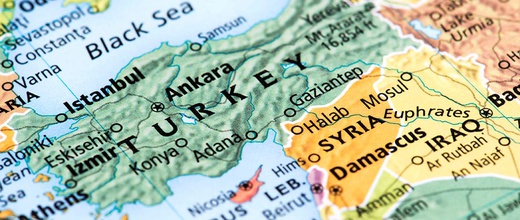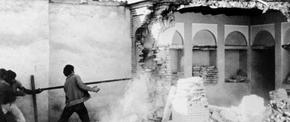The views expressed in our content reflect individual perspectives and do not represent the authoritative views of the Baha'i Faith.
Like all great religions, the birth of the Baha’i Faith was witnessed only by a handful of faithful followers in a time of persecution and danger.
Imprisoned, tortured, poisoned and now banished for the second time in a decade, Baha’u’llah had what seemed to be a perilous future. The small band of his followers who accompanied him on his exile from Baghdad risked their own futures to go with him. But those who visited Baha’u’llah in the Garden of Ridvan noticed that he never complained about his treatment by the government. His only thought seemed to center around weaving ties of fellowship and love among the citizens of Baghdad.
But the Ottoman government would not relent. In early May of 1863, Baha’u’llah left Baghdad in a caravan of fifty mules, several horses and ten armed Ottoman guards. He shared the arduous journey with his family and twenty-six of his followers allowed to go into exile with him. The Governor of Baghdad, an admirer and sympathizer who had only delivered Baha’u’llah’s banishment order reluctantly after much pressure from the Ottoman Empire itself, ordered each village where they stopped along the way to host the exiles. The journey took more than three months. Baha’u’llah arrived in Constantinople (now known as Istanbul), the capital of the Turkish Empire, in August of 1863.
The custom in those times required people visiting the capital to call on ministers and try to obtain an audience with the Sultan. For most Persians in the Turkish capitol, this means of social climbing, political maneuvering, or begging favors from ministers seemed normal. But in stark contrast, Baha’u’llah chose not to call on any ministers or officials. When asked why, Baha’u’llah said:
Pursuing the path of obedience to the King’s command We have come to this country. Beyond this We neither had nor have any aim or desire that We should appeal and cause trouble. What is [now] hidden behind the veil of destiny will in the future become manifest …. Under these circumstances what need is there for importuning statesmen and supplicating ministers of the Court? We are free from every anxiety, and ready and prepared for the things predestined to Us. – Abdu’l-Baha, A Traveller’s Narrative, p. 53.
The Persian Ambassador used Baha’u’llah’s refusal to bow before his oppressor as a means of swaying opinion against him at the Royal Turkish court. The Ambassador’s interpretation of Baha’u’llah’s actions presented him as a lawless agitator who felt himself above authority and as a danger to both the Persian and Turkish thrones. Despite the obvious fact of Baha’u’llah’s exile and imprisonment, the Ambassador’s four-month rumor campaign succeeded: the Sultan of Turkey ultimately issued another edict of banishment against Baha’u’llah.
Almost immediately Baha’u’llah, his family, and a dozen companions faced a third exile, this time over the mountains in the dead of winter to Adrianople—now known as Edirne, in Eastern Thrace, situated in the northeastern part of modern-day Turkey, close to the borders of Greece and Bulgaria.
Armed officers placed them and their belongings in crude carts and marched them through twelve days of frozen, barren terrain. Unusually severe winter cold froze everything and everyone, and the exiles did not have adequate clothing to protect them from the elements. They had to build fires to melt ice from the frozen rivers to get drinking water. On the road, they saw the bodies of several travelers who had frozen to death. When they finally arrived in Adrianople, they stayed in a caravanserai, then the authorities moved them to a small, prison-like home. Baha’u’llah’s daughter described the horrible conditions of the house:
That winter was a period of intense suffering, due to cold, hunger, and, above all, to the torments of vermin, with which the house was swarming. These made even the days horrible, and the nights still more so. When they were so intolerable that it was impossible to sleep, my brother [Abdu’l-Baha] would light a lamp (which somewhat intimidated the vermin) and by singing and laughing seek to restore the spirits of the family.
Adrianople marked the farthest point from Persia in Baha’u’llah’s series of exiles, and the only time in recorded history that the founder of a major world religion lived on the European continent.
After a few months in Adrianople, Baha’u’llah arranged to move the group of exiles to a house near the towering minarets of the great mosque of Sultan Salim. Once again the exiles settled into a new location, keeping themselves busy and earning their livelihood with the various trades and businesses that Baha’u’llah had encouraged them to pursue.
Baha’u’llah spent five years in Adrianople, which he called “The Land of Mystery.” In Constantinople and then in Adrianople, Baha’u’llah met less with public officials than he had in Baghdad. Instead, Baha’u’llah’s eldest son Abdu’l-Baha, now a young man, took those tasks upon himself. The writings of Baha’u’llah increased in volume and broadened in scope. In Adrianople, while still a prisoner, Baha’u’llah began to write to the kings and rulers of the world.

















Comments
Sign in or create an account
Continue with Facebookor